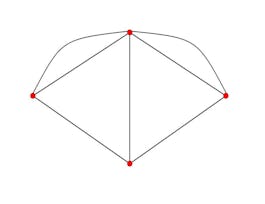How do revolutions emerge without anyone expecting them? How did social norms about same sex marriage change more rapidly than anyone anticipated? Why do some social innovations take off with relative ease, while others struggle for years without spreading? More generally, what are the forces that control the process of social evolution –from the fashions that we wear, to our beliefs about religious tolerance, to our ideas about the process of scientific discovery and the best ways to manage complex research organizations?


Network Dynamics of Social Behavior
Taught in English
Some content may not be translated
13,202 already enrolled
(378 reviews)
Details to know

Add to your LinkedIn profile
6 quizzes
See how employees at top companies are mastering in-demand skills


Earn a career certificate
Add this credential to your LinkedIn profile, resume, or CV
Share it on social media and in your performance review

There are 6 modules in this course
This week will introduce students to agent-based modeling and social network theory. We will present one of the earliest and most famous agent-based models, Thomas Schelling’s model of segregation, which shows how segregation can emerge in a population even when people individually prefer diversity. This week will demonstrate this model both conceptually and with NetLogo, and illustrate how agent-based models can be used to demonstrate sufficient conditions for the emergence of social phenomena.
What's included
7 videos1 quiz
This week will introduce students to social network theory and the “small worlds” paradox. We will introduce contagion models of diffusion, and discuss how network structure can impact the speed with which information spreads through a population. This week includes both high level conceptual overviews of social network theory, explaining how networks are used to represent complex social relationships, as well as technical descriptions of two basic types of networks.
What's included
7 videos1 quiz
This week will begin by discussing the limitations of simple disease-like models of social contagion, introducing the idea of “complex contagions” to model people’s frequent need for social reinforcement before spreading a piece of information or behavior. While simple contagions always spread faster as networks get smaller, this week will demonstrate the paradoxical nature of complex contagions, which can spread slower (or not at all!) in the smallest networks.
What's included
6 videos1 quiz
How can behaviors become popular even when most people dislike them? This week will introduce a model based on the classic allegory by Hans Christian Anderson, “The Emperor’s New Clothes.” We will first provide a conceptual overview of the model, discussing the role of private versus public beliefs and the enforcement of social norms. We will then present this model in NetLogo, showing which conditions favor the spread of unpopular behaviors.
What's included
6 videos1 quiz
This week will tackle another puzzle in social conventions: how can populations reach widely shared social conventions in the absence of any central organizing mechanism? We will begin by discussing classic explanations for the emergence of conventions, and why these explanations are insufficient to explain our social world. We will then discuss an agent-based model of conventions that builds on a model of local peer-to-peer coordination, and use NetLogo to show how local interactions can generate global convergence.
What's included
5 videos1 reading1 quiz
How can you best organize a team to produce innovative solutions to complex problems? If people on the team can’t communicate, then they can’t share strategies, and won’t learn from each other’s success. But if they communicate too much, they’ll cluster around just a few ideas, and won’t explore the entire problem space. This week introduces an agent-based model of problem solving and shows how network structure can be used to navigate this classic exploration/exploitation trade-off.
What's included
7 videos1 quiz
Instructor

Offered by
Recommended if you're interested in Governance and Society

Stanford University

Politecnico di Milano

University of Illinois at Urbana-Champaign
Why people choose Coursera for their career




Learner reviews
Showing 3 of 378
378 reviews
- 5 stars
73.01%
- 4 stars
20.37%
- 3 stars
4.23%
- 2 stars
0.79%
- 1 star
1.58%

Open new doors with Coursera Plus
Unlimited access to 7,000+ world-class courses, hands-on projects, and job-ready certificate programs - all included in your subscription
Advance your career with an online degree
Earn a degree from world-class universities - 100% online
Join over 3,400 global companies that choose Coursera for Business
Upskill your employees to excel in the digital economy
Frequently asked questions
Access to lectures and assignments depends on your type of enrollment. If you take a course in audit mode, you will be able to see most course materials for free. To access graded assignments and to earn a Certificate, you will need to purchase the Certificate experience, during or after your audit. If you don't see the audit option:
The course may not offer an audit option. You can try a Free Trial instead, or apply for Financial Aid.
The course may offer 'Full Course, No Certificate' instead. This option lets you see all course materials, submit required assessments, and get a final grade. This also means that you will not be able to purchase a Certificate experience.
When you purchase a Certificate you get access to all course materials, including graded assignments. Upon completing the course, your electronic Certificate will be added to your Accomplishments page - from there, you can print your Certificate or add it to your LinkedIn profile. If you only want to read and view the course content, you can audit the course for free.
You will be eligible for a full refund until two weeks after your payment date, or (for courses that have just launched) until two weeks after the first session of the course begins, whichever is later. You cannot receive a refund once you’ve earned a Course Certificate, even if you complete the course within the two-week refund period. See our full refund policy.



